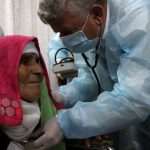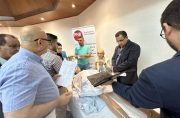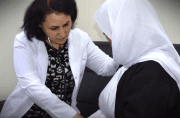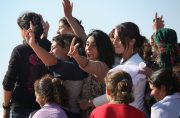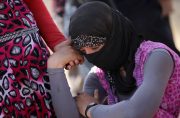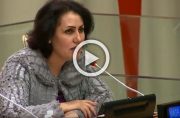Our work in Iraq is centered on building up the country’s ability to investigate crimes of torture, including sexual violence. Our focus is support to investigations of international crimes committed by Islamic State of Iraq and Syria (ISIS) in northern Iraq, particularly against the long-persecuted Yazidi people, who suffered a brutal 2014 attack by ISIS in which thousands of men, women, boys, and girls were killed, forced into flight, or abducted, raped, and enslaved.
PHR works with Iraqi partners at the Medical-Legal Directorate (MLD) and the Medical-Legal Institutes (MLIs) in governorates across Iraq, including in the Kurdistan Region of Iraq to develop a standardized forensic medical form to document torture and sexual and gender-based violence (SGBV). The Forensic Medical Form is designed to reflect international good practices including the Istanbul Protocol, the International Protocol on the Documentation and Investigation of Sexual Violence in Conflict, and the Murad Code. The form ensures that forensic medical evidence is consistently documented and used in investigations and prosecutions of the perpetrators of torture, including sexual violence.
More than 85 percent of forensic doctors across the country have been trained by PHR on forensic medical documentation.
PHR continues to work with the forensic sector to ensure accurate implementation of the forensic medical form which is built with a country-wide gradual roll-out plan. In addition, PHR continues to work with the medical and judicial and legal sectors in Iraq to strengthen survivor-centered forensic medical documentation of torture and sexual violence that ensures that survivors receive appropriate documentation, have their voices heard, and are treated with dignity and respect throughout the forensic examination process.
Our History
In 1991, PHR investigators traveled to Iraqi Kurdistan to help exhume, identify, and determine the probable cause and manner of death of victims found buried in single and mass graves.
Between December 23 and December 29 1991, our delegation traveled from Zakho, the northernmost town in Kurdish-controlled Iraq, to Erbil and Sulaymaniyah in the south. In each of these cities, we interviewed relatives of the disappeared, former political prisoners, and Kurdish investigators and political leaders. We took testimony from grave diggers who, years earlier, had been ordered by Iraqi officers to secretly bury the bodies of executed political prisoners. Our findings were published in the report, “Unquiet Graves.”
Also that year, PHR conducted an investigation into the serious medical consequences of Iraq’s invasion of Kuwait. Our team found evidence of assaults on health professionals, interference with the delivery of health care, the stripping of medicine and medical supplies from health facilities, and the stationing of military personnel in hospitals – all violations of international humanitarian law and international human rights law.
In 1989, PHR’s report, “Winds of Death,” contained evidence that Iraq’s army had attacked Kurdish villages with bombs containing mustard gas and an unknown lethal nerve agent.
In the report, PHR investigators used a survey and medical examinations to corroborate accounts of chemical weapons attacks. In 1993, their findings were further supported by soil samples taken by a PHR and Human Rights Watch team investigating casualties of the Anfal Campaign. Those samples were analyzed by the British Chemical & Biological Defence Establishment (CBDE), a British Ministry of Defence laboratory. The CBDE tests found trace amounts of the compounds that comprise mustard gas and sarin.
In the post-9/11 period, PHR warned of the serious risk to the health and human rights of the Iraqi people in the event of war. We also highlighted the grave health consequences and legal requirements surrounding the interrogation, torture, and ill-treatment of detainees, and called on the U.S. government to clarify the involvement of health professionals in these brutal methods.

